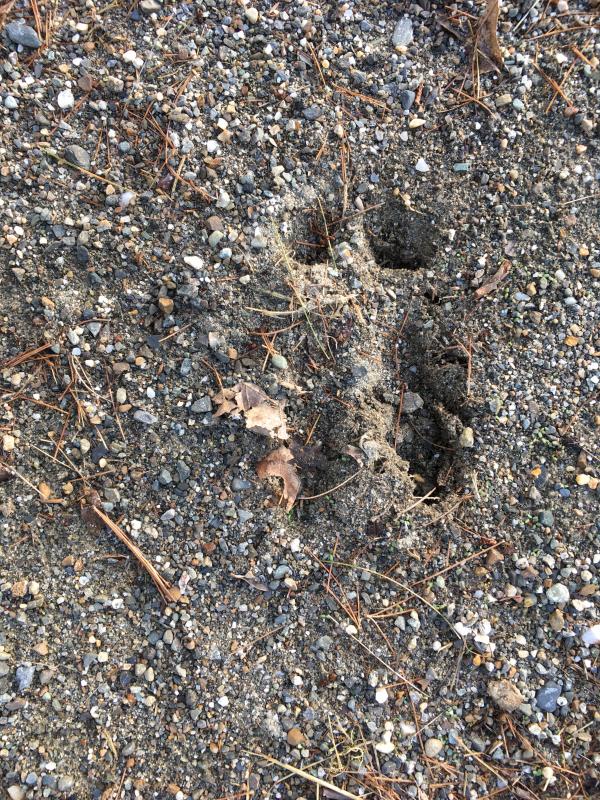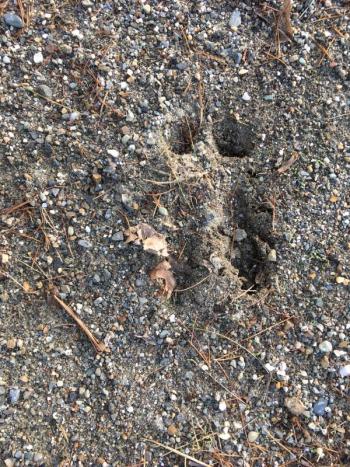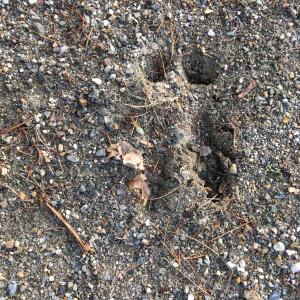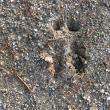This Week in Lincolnville: A Moose in the Neighborhood
The first tracks were faint, but suggestive. Surely they were too big for a deer, and not neat. Deer leave sharply-defined V-shaped tracks, crisp and undeniable. These were a wider V, softer, and definitely big. But they barely left an imprint on the hard shoulder of Canaan Road, the road that leads to Ducktrap.
Like the few folks that still can’t call this house the O’Brien place, but insist it’s the Claytor house (two owners and 60 years ago), I default to Canaan Road, the original name for Lincolnville that wasn’t Ducktrap. In other words, everything inland was called Canaan.
Then, a couple of days ago, there it was: a perfectly clear moose track, deeply imprinted in a muddy stretch of shoulder. And then came a series of little moose tracks, again, not deer. Are a mama moose and calf visiting Frohock Brook? A few other faint tracks on Beach Road indicate they might be wandering back and forth. Frohock flows between these two roads on its way to the Bay, through the salt marsh behind the Beach shops, and emptying out between the Whales Tooth and the Pound.
It's been years since I’ve spotted a moose; the last time might have been on the edge of the field at Tanglewood Corner where a young moose hung out for several days, leading us to wonder if it was sick. Again, it was in the Frohock Brook neighborhood, a wild, seldom-visited, tangled patch of woods.
We live on the narrow edge of it, meaning on a winter’s evening, we can see, through the woods and across the brook, our Canaan Road neighbors’ lights. Check out what the satellite sees, a vaguely triangular shape, sort of a wizard’s hat shape, with Atlantic Highway its base and the Slab City/Beach Road intersection its apex. Frohock Brook parallels the Beach Road leg.
Moose occasionally visit, or perhaps are there all along, but only rarely show themselves. Wally and I cherished the memory of the triplet calves and their mother we came upon, crossing Slab City not far from that intersection. Moose don’t have triplets everyone said. Hmmmm. My son reminded me of the triplet bear cubs he and his dad encountered near their Baxter Park campsite when he was a young teen. Well, sometimes animal mothers surprise you.
CALENDAR
MONDAY, Apr. 18
Town Office closed for Patriots Day
TUESDAY, Apr. 19
Library open, 3-6 p.m., 208 Main Street
Book Group discussion at 5 p.m.
WEDNESDAY, Apr. 20
Library open, 2-5 p.m., 208 Main Street
Master Gardeners talk, 7 p.m., Zoom
Comprehensive Plan Review Committee, 7 p.m., Town Office
THURSDAY, Apr. 21
Broadband Committee, 6 p.m., Town Office
FRIDAY, Apr. 22
Library open, 9-noon, 208 Main Street
SATURDAY, Apr. 23
Library open, 9-noon, 208 Main Street
EVERY WEEK
AA meetings, Tuesdays & Fridays at noon, Community Building
Lincolnville Community Library, For information call 706-3896.
Schoolhouse Museum by appointment, 505-5101 or 789-5987
Bayshore Baptist Church, Sunday School for all ages, 9:30 a.m., Worship Service at 11 a.m., Atlantic Highway
United Christian Church, Worship Service 9:30 a.m., 18 Searsmont Road or via Zoom
Now that the ice is finally gone, along with it the excuse for not walking (all right, it’s been gone for over a month) I head out most mornings for Maplewood Cemetery and back, a 2.7 mile round trip. After 50 years of walking, jogging, even riding in a sulky behind our pony, Cocoa, along the same route, it’s never boring.
In the winter avoiding the ice, picking my way along the graveled patches, to March/April mud, to the flourishing roadside plants of June there’s always something to see. The retreating snow reveals what we citizens of Lincolnville have been eating and drinking this past winter: Dunkin Donut wrappers, McDonald’s debris, Bud Light, Mick Ultra, tiny Fireball bottles, an occasional orange juice container, pizza crusts (which Fritz gobbles). You get it.
Turkey and deer tracks – sometimes moose! – abound in the shoulder mud, while the squished corpses of frogs and salamanders appear as spring takes hold. The several vernal pools visible from the road hold the eggs of these fascinating amphibians that manage living both under water and on top of land.
A friend of mine puts herself to sleep on restless nights reciting all the verses of favorite hymns. I pass the warm June mornings, tromping along my so familiar route, listing out loud the plants that grow along my country road. I’d give you a list now, but can’t remember more than a few at the moment. Coltsfoot, rabbitsfoot clover, St. John’s Wort, rugosa rose, daylily.
And here’s a distinction; there are two kinds of roads – state roads and town roads. The numbered roads – Beach, Hope, Camden and Belfast Roads (173, 235, and 52 respectively) are the state’s, maintained by MDOT (Maine Department of Transportation), while the others such as Ducktrap, Youngtown, Slab City, Heal, Town House, and numerous others are town roads maintained by the town. Those don’t have a centerline painted down the middle because they aren’t wide enough to meet the standard for a two-lane road, even though we drive them as if they are.
Recently MDOT came along Beach Road looking for problematic trees, that is, ones that are in the state right of way and look as if they might come down into the road sometime soon. A few weeks later an Ausplundh tree crew cut down four between Slab City intersection and Atlantic Highway. One rather spindly looking maple was on our property, and leaning precariously over the road. Two others were enormous pines which had lost their tops in this winter’s high winds.
The pines were felled back into the woods, leaving a tangle of branches and trunks that are more than 2 feet across at their butts. Presumably these behemoths will lie on the ground for the next 50 years. Over on Ducktrap Road at least two large pines snapped off their tops and landed in the road. Within a short time someone (road crew? random guy with a chain saw?) came along and cut them into pieces and rolled them off the road.
At this time of year, walking in the Frohock Brook neighborhood, you’re never out of earshot of running water. It’s like we live on a sponge, one that soaks up all the melting snow and spring rains until it can’t hold any more and then lets it all leak out. Flat or low areas of land turn into soggy marshy bogs or maybe those fascinating vernal pools where all kinds of living things procreate and hatch. But there aren’t many flat places in Lincolnville. Water is constantly running downhill, even when the hill is barely discernible to the eye. These slopes collect the water into seasonal streams that flow, eventually in my part of town, into Frohock Brook, a mini watershed I guess.
But roads get in the way, and when rainfall is excessive (like recently!) the tiny streams become big streams and even where there are culverts to carry them under the road, the amount of water overwhelms them. Shoulders are gouged out by water running down them, driveway entrances destroyed and culverts are washed out.
Five culverts carry water under Ducktrap Road and down, eventually to Frohock Brook. Imagine what that road was like before it was paved, before there were culverts. The road itself is at least two feet higher than the land on either side, past the ditches that line much of it. This is one of the older roads in town, and it must have become something of a ditch after decades of wheeled vehicles pulled by oxen and horses carved it out.
An example of an abandoned road that happened to is just off High Street. The Lloyd Thomas Road is part of the old Augusta Road, and once continued across High Street to the driveway of 294 Searsmont Road. This stretch was abandoned long ago; Barbara Johnson Tarantino remembered walking along it as a girl on her way to 4-H meetings in the Center in the 1930s, though it had been unused for many years even then.
Today it’s a deep ditch filled with a nearly impassable tangle of brush, but it shows what the early roads must have become after years of travel. Our modern roads have been built up, most likely with rocks and other debris (Rosey Gerry swears he watched a Model T pushed into the ditch that would become today’s Greenacre Road), then gravel and layer after layer of asphalt. And along the way, culverts were installed to protect the roadbed from erosion.
Bessie Dean, who drove a school bus (actually a woody station wagon) in the 1940s, remembered a certain dip in Youngtown Road that became a treacherous mud hole every spring. I think of her every time I drive over it.
Our roads are part of the miracle that transformed this rough terrain, soggy as a sponge, hilly, and rocky beyond belief, into an easily traveled town, where we can get to the Center in five minutes instead of an hour, to Camden in ten, to Belfast in twenty, to Boston and beyond.
Mud season was a rough time of year, the weeks between going on runners and changing to wheels, as diarist and rural delivery guy Ralph Richards noted. It was the season when Eliza Higgins, house bound with only her husband, wrote to her daughter Helen in 1873 “I haven’t seen another woman in weeks.”
Library
Librarian Sheila Polson writes:
“Everyone is welcome to join the library book group for a discussion of Amore Towles' novel The Lincoln Highway this Tuesday, April 19 at 5 p.m. Spanning ten days and told from multiple points of view, the book is filled with an array of richly imagined settings, characters and themes.
“Coming up on Wednesday at 7 p.m., master gardeners Allison Tunick and Allan Amioka will give a virtual talk on the Pollinator-friendly Garden Certification Program. The volunteers will explain the program application process and how to create a beautiful garden for bees, butterflies, hummingbirds and other pollinators. This is a follow-up to the March 23 talk by Allison and Allan on native plants. The certification program is sponsored by the University of Maine Cooperative Extension Service.
“For more information and to receive the Zoom link, please call the library at 706-3896 or email. “
Pottery and Tools of First People of Lincolnville
There will be a two-hour, hands-on workshop to learn how to identify and date artifacts in the Lincolnville Historical Society’s collection, April 29th, Lincolnville Historical Society - 9 - 11 a.m., LHS office, second floor of 33 Beach Road
Space is limited to 10 people and some slots are already filled. What to bring - writing and sketching journal, pencils, curiosity and questions. Parking space is limited. To enroll: contact Cyrene Slegona .
Condolences
Mary Lou Eugley who passed away at the age of 98 recently, had a wonderful memory for her years as a young wife in Lincolnville during the war, WW II. Her story is in Staying Put. I’m so glad to have known her. Condolences to her family.
.


























